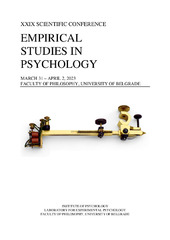Приказ основних података о документу
Understanding Sentiment Towards Russia-Ukraine War: The Role of the Militant Extremist Mindset (Mems) and Big Five Personality
| dc.creator | Jakšić, Ivana M. | |
| dc.creator | Jović, Nikola | |
| dc.date.accessioned | 2023-11-29T14:46:28Z | |
| dc.date.available | 2023-11-29T14:46:28Z | |
| dc.date.issued | 2023 | |
| dc.identifier.isbn | 978-86-6427-247-6 | |
| dc.identifier.uri | http://rfpn.fpn.bg.ac.rs/handle/123456789/1064 | |
| dc.description.abstract | Serbia’s political positioning towards the Russia-Ukraine war is a highly contentious public issue and thus there is importance in understanding the factors that predict attitudes in this domain. In the current study we sought to examine individual differences in the sentiment towards the Russia-Ukraine war with a particular focus on Militant Extremist Mindset (subscales: Proviolence, Vile world, Divine power) and Big Five personality traits (Extraversion, Agreeableness, Neuroticism, Openness and Conscientiousness). The sentiment towards the war is operationalized through War Anxiety (WAS), positive and negative emotions in relation to war (self-reported on a Likert scale), accountability perceptions of different actors (Russia, Ukraine, NATO, EU, and USA) and attitude towards imposing sanctions against Russia. The data was collected in Aprile 2022 by combining face-to-face and online surveying, on a two-stage stratified (region and education) random sample of 917 adults. The predictive power of personality predictors was tested after controlling for socio-economic variables (age, education, urbanization). A total of 8% of variance in war anxiety (WAS) can be explained with neuroticism (ꞵWAS = -.23, p < .01), agreeableness (ꞵWAS = .13, p < .01), and Divine power (ꞵWAS = .13, p = .01). Emotions in relation to war can be explained by agreeableness, neuroticism, conscientiousness, Proviolence and/or Divine power (7% of variance in negative emotions and 16% of variance in positive emotions), with MEMS factors being particularly predictive for positive feelings in relation to war (13% of variance explained). Perceived accountability of the Ukraine, NATO, EU, and USA is positively predicted by Vile World (ꞵ = .33, p < .01, 10% of variance explained), while Russia's accountability is negatively predicted by all MEMS factors (Proviolence ꞵ = -.14, p < .01, Vile world ꞵ = -.12, p < .01, Divine power ꞵ = -.18, p < .01, 8% of variance explained). Agreeableness predicted positive attitude towards imposing sanctions against Russia, explaining 4% of variance (Wald = 5.35, p = .02). As expected, sentiment towards RussiaUkraine war reflects personality traits typically predictive of political behavior and even greater extent radical and violent extremism mindset. Relatively small percentage of criteria explained variation suggests that the explanations of the war related attitudes should be expanded to the domain of more specific political attitudes, social identity, as well as social influence processes shaping public opinion. | sr |
| dc.language.iso | en | sr |
| dc.publisher | Belgrade : Faculty of Philosophy University of Belgrade | sr |
| dc.rights | openAccess | sr |
| dc.rights.uri | https://creativecommons.org/licenses/by/4.0/ | |
| dc.source | XXIX Scientific Conference Empirical Studies in Psychology | sr |
| dc.subject | emotions | sr |
| dc.subject | war anxiety | sr |
| dc.subject | Big Five | sr |
| dc.subject | Militant Extremist Mindset (MEMS) | sr |
| dc.subject | Russia Ukraine War | sr |
| dc.title | Understanding Sentiment Towards Russia-Ukraine War: The Role of the Militant Extremist Mindset (Mems) and Big Five Personality | sr |
| dc.type | conferenceObject | sr |
| dc.rights.license | BY | sr |
| dc.citation.epage | 60 | |
| dc.citation.spage | 59 | |
| dc.identifier.fulltext | http://rfpn.fpn.bg.ac.rs/bitstream/id/2889/fulltext.pdf | |
| dc.identifier.rcub | https://hdl.handle.net/21.15107/rcub_rfpn_1064 | |
| dc.type.version | publishedVersion | sr |

